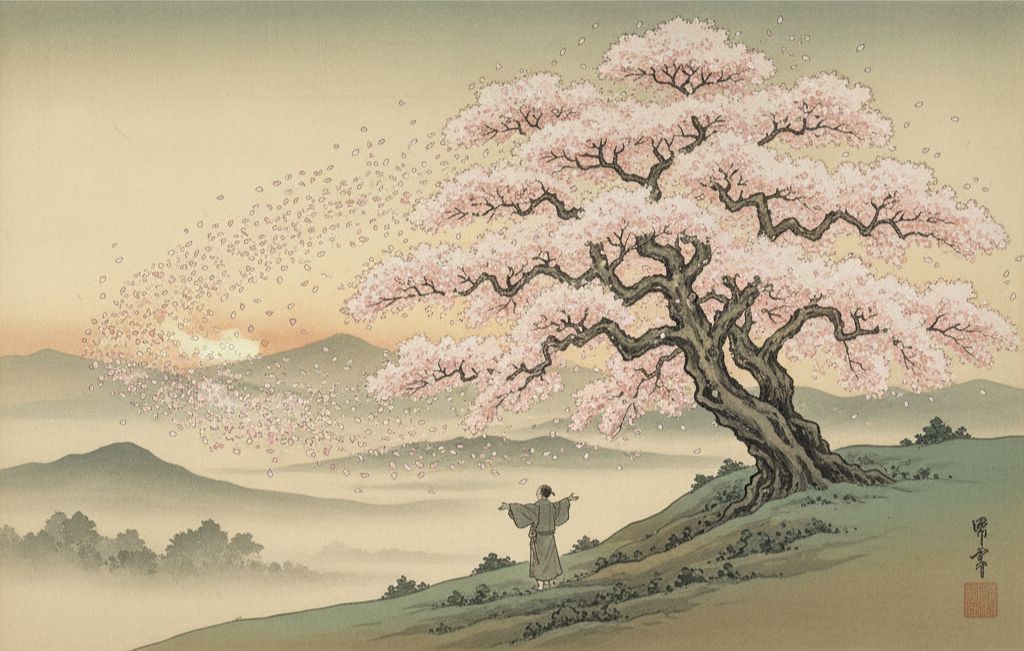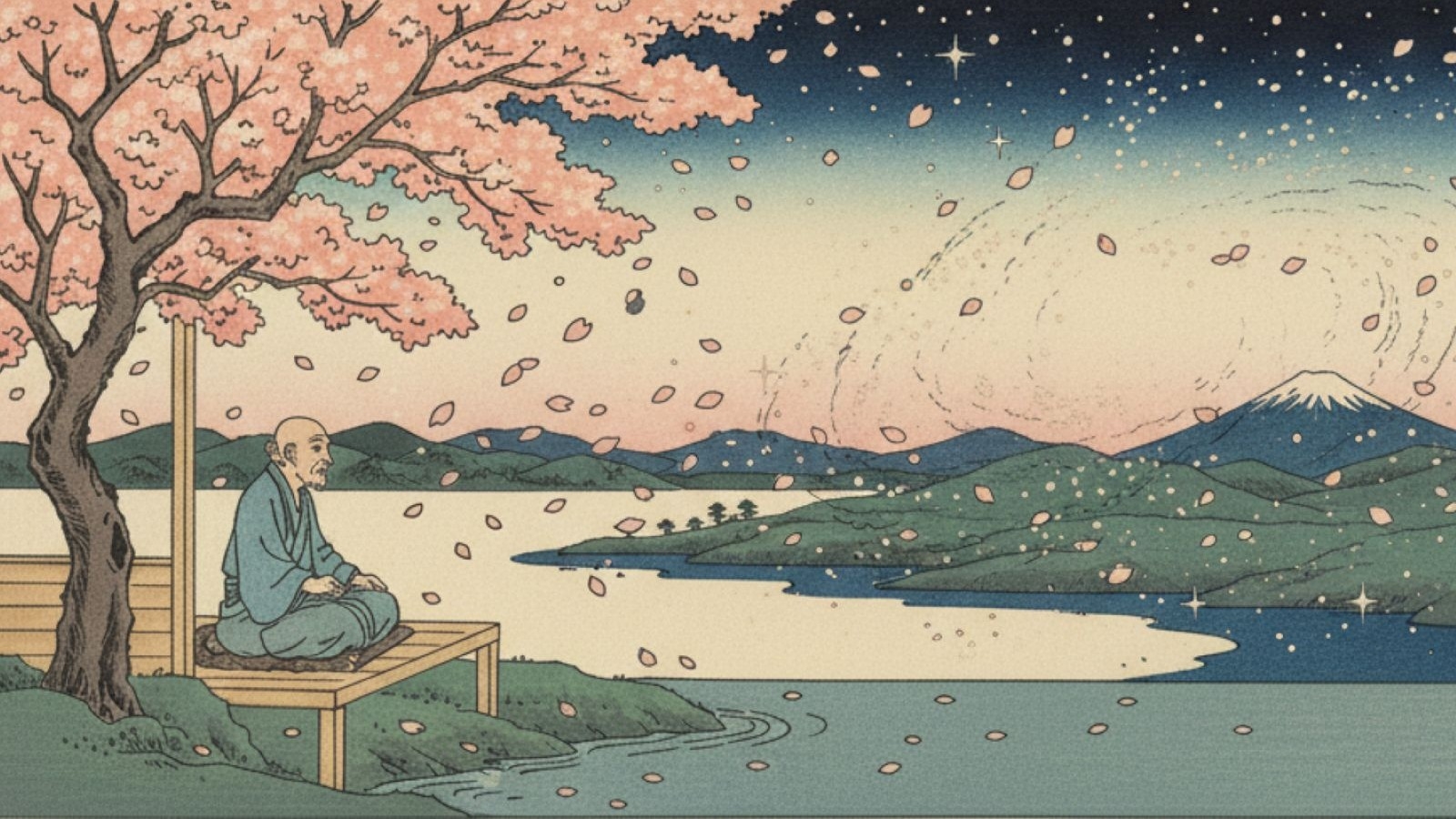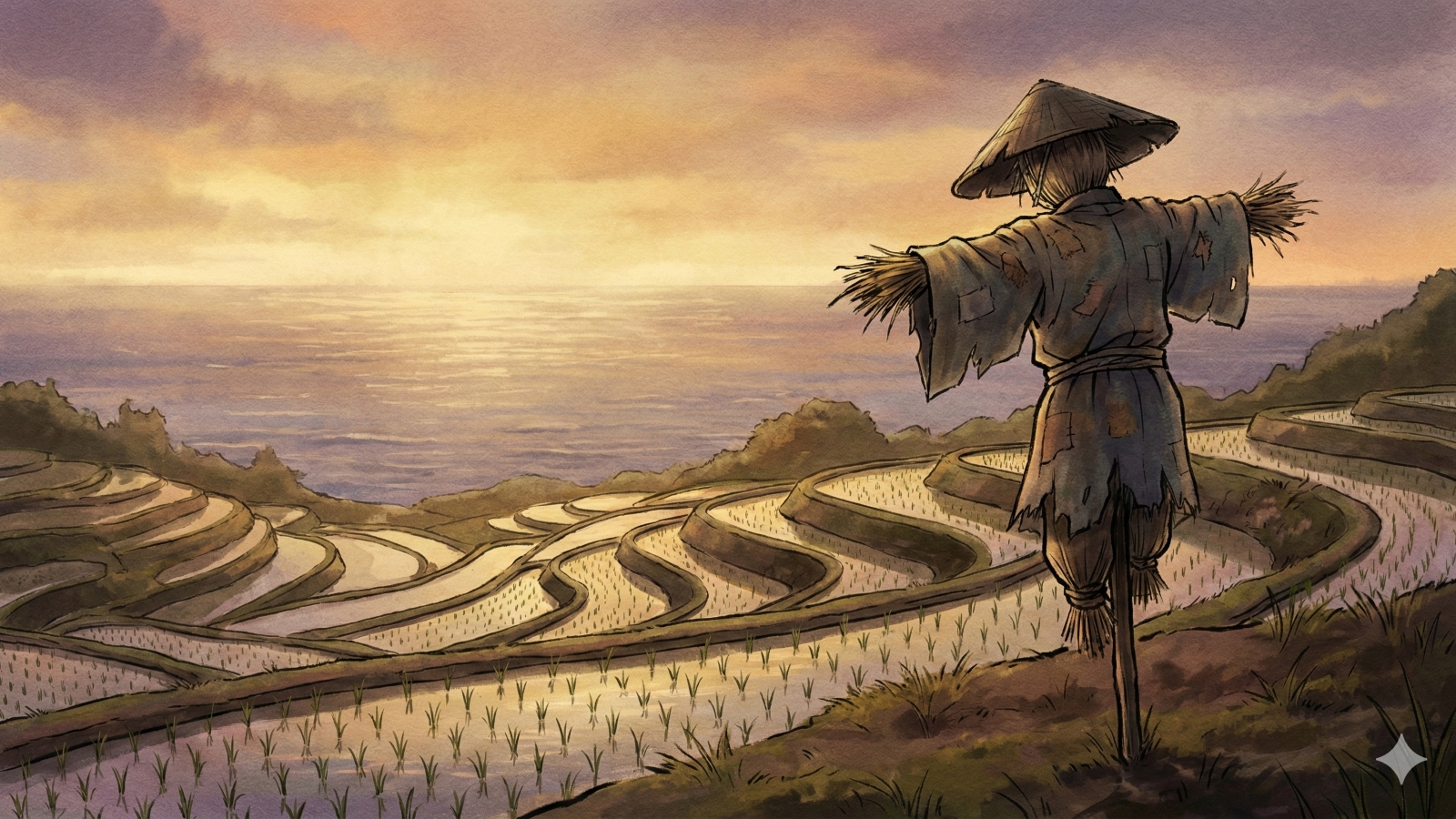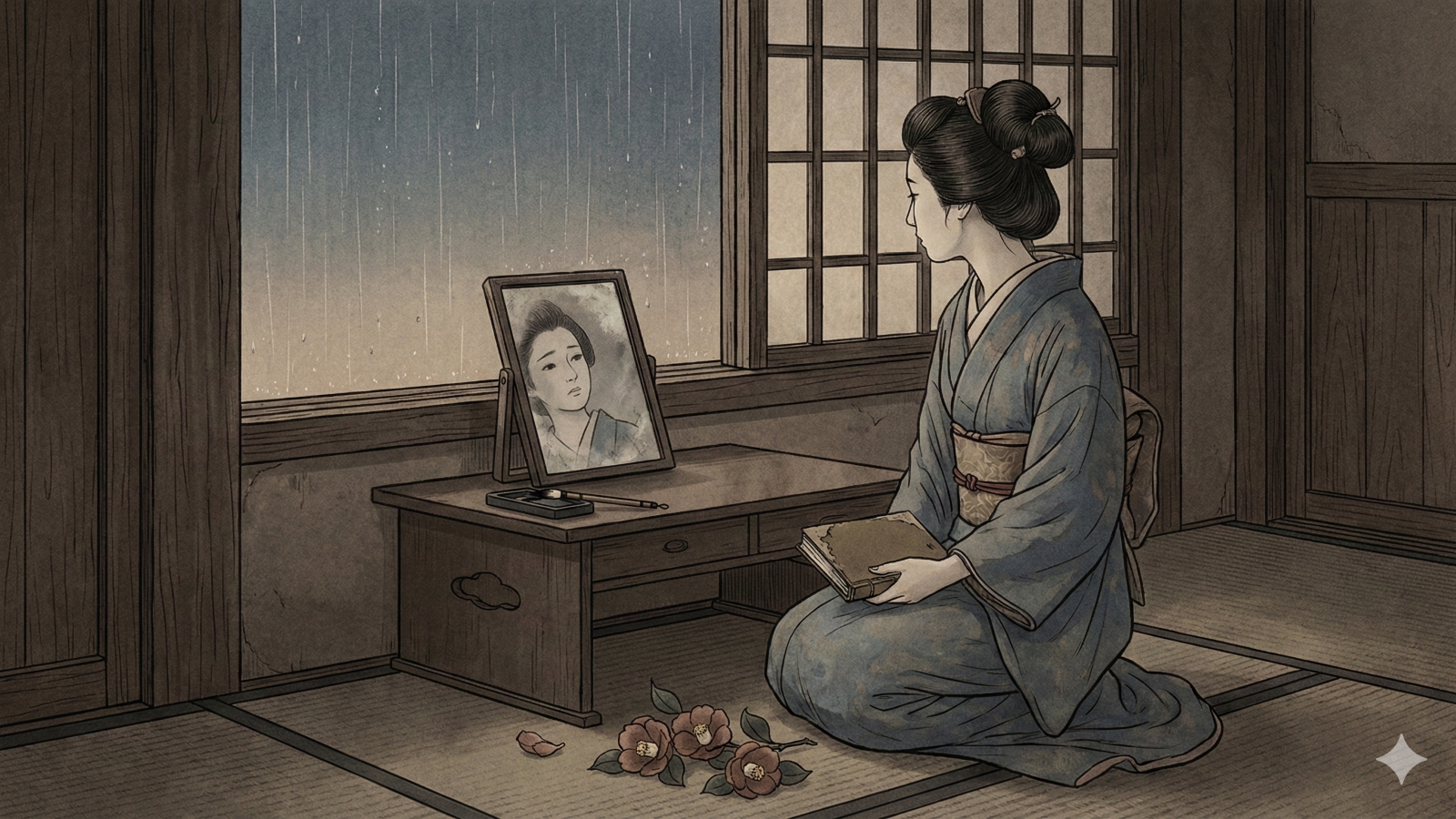Flow and Aesthetics - Nakahara and Tenshin on Embracing Fleetingness
Life is as unreliable as a draft of wind, yet as beautiful as a rubber balloon. If so, how should we cherish its momentary brilliance? In this article, we will explore the truth of a life made precious by its fleeting nature, guided by the words of Chūya Nakahara, who grasped impermanence through "sensation," and Okakura Tenshin, who elevated it to a "philosophy."

「確固たるものの如く、また隙間風にも消え去るものの如く」
“Like something solid, and like something that vanishes in a draft.”
— Chūya Nakahara, Early Spring Walk
[Commentary]
It seems certain, yet it is unreliable. Perhaps that is the nature of our hearts. This poem depicts a scene where the poet, walking along a riverbank in early spring, overlays his own inner world with the changing season. Blown by the cold wind and sensing the signs of spring, his heart feels as if it is being torn apart like thin silk and scattered to the wind. The quoted passage captures this wavering existence as something that is both solid and yet ephemeral enough to be swept away by a draft. This ambiguity conveys to us the wonder of being and the underlying echo of impermanence.
「近い過去も遠いい過去もおんなじこつた」
“The recent past and the distant past are all the same.”
— Chūya Nakahara, Clouds
[Commentary]
Doesn’t it sometimes seem that all of time past appears in the same color? This poem is a work in which the poet, while gazing at clouds flowing over a mountain, delivers a monologue on past memories and present resignation. Memories of eating a bento box on the mountain and images of a young girl scattering like cherry blossoms come to mind, but they are now beyond reach. The quoted sentence succinctly expresses a view of impermanence—that both the all-too-vivid recent past and the distant, unreachable past are, in the end, equally gone. These words, seemingly careless yet striking at a truth, are sure to make one feel the transience of life, where all events become equal before the flow of time.
「まことに人生、一瞬の夢、ゴム風船の、美しさかな。」
“Truly, life is a momentary dream, the beauty of a rubber balloon.”
— Chūya Nakahara, Songs of Bygone Days, “Kasuga Kyōsō”
[Commentary]
Is life like a balloon that soars into the sky only to vanish? This is a line from “Kasuga Kyōsō,” a poem that depicts the sense of emptiness after losing a loved one, and the everyday life that nonetheless continues. The narrator, while holding a deep sense of loss, feeds pigeons in a shrine’s precincts and exchanges pleasantries with an acquaintance. Amidst this calm daily routine, he suddenly realizes that life as a whole is like a fleeting dream, as beautiful and fragile as a rubber balloon. This gaze, verging on resignation, is thought to evoke in the reader a quiet, clear-eyed view of impermanence that lies beyond sorrow.
「僕等の命も煙草のやうにどんどん燃えてゆくとしきや思へない」
“I can only think that our lives, too, are burning away like a cigarette.”
— Chūya Nakahara, A Cloudy Autumn
[Commentary]
Perhaps our lives are, moment by moment, burning out like a lit cigarette. This poem is a work in which the poet, while talking with a friend under a lamplight on a cloudy autumn night, reflects on the finiteness of life. The question of what becomes of vivid memories and impressions in the vastness of eternity is posed, and a sense of resignation toward an unchangeable reality pervades the piece. The quoted line is the conclusion reached at the end of such contemplation, confronting us with the inescapable fact that life simply burns away like a cigarette. This poignant metaphor leaves a strong impression of the tangible feel of being alive and, on its flip side, the fading destiny—that is, the transience of life.
「じつと手を出し眺めるほどの/ことしか私は出来ないのだ。」
“All I can do is hold out my hands and gaze at them.”
— Chūya Nakahara, Songs of Bygone Days, “My Half-Life”
[Commentary]
If, after enduring many hardships, all one can do is stare at one’s own hands, what then is life? This is an excerpt from the poem “My Half-Life,” placed near the end of the collection Songs of Bygone Days. The poet looks back on his life as having been “quite a struggle,” but asserts that he will neither question its value nor speak of its contents. Now that the past is all gone, all he can do at his desk is to simply gaze at his hands. This act, filled with a sense of powerlessness, seems to highlight the transience of a life where all experiences return to nothing, and the solitary figure of a human who, nevertheless, has no choice but to exist.
「その身とてもただ荒野にたてた仮りの小屋、あたりにはえた草を結んだか弱い雨露しのぎ」
“The body itself is but a temporary hut built in the wilderness, a fragile shelter from the elements made by tying together the grasses growing around.”
— Okakura Tenshin, The Book of Tea (translated by Hiroshi Muraoka)
[Commentary]
What if life were a grass hut built for a single night in the wilderness? This book explains the simple structure of the tea room not merely as an architectural style, but as a reflection of Zen philosophy. Unlike permanent stone buildings, the tea room, with its thatched roof and slender pillars, suggests its own temporary nature. This is interpreted as a symbol of the fundamental impermanence of our bodies and our lives—that we are fragile beings taking temporary shelter in nature. A spirit that finds beauty not in material permanence but in its very transience is alive here.
「変化こそは唯一の永遠である。」
“Change is the only eternal.”
— Okakura Tenshin, The Book of Tea (translated by Hiroshi Muraoka)
[Commentary]
Does anything that does not change truly exist in this world? In discussing the spirit of ikebana (flower arrangement), which is deeply connected to the tea ceremony, this book presents the Eastern worldview that all things are in a state of flux. Everything is born, and everything perishes. This passage paradoxically asserts that such transience is the only unchanging truth in this world. Therefore, death and decay are not seen as mere endings but as necessary processes that enable new creation. This philosophy leads to an attitude of actively embracing, rather than simply mourning, the fragility and impermanence of life.
「どうして花はかくも美しく生まれて、しかもかくまで薄命なのであろう。」
“Why were the flowers born so beautiful, and yet so fated to die?”
— Okakura Tenshin, The Book of Tea (translated by Hiroshi Muraoka)
[Commentary]
Why is it that the more beautiful something is, the shorter its life? The author poses a sharp question about human heartlessness in devaluing the lives of flowers, citing their treatment in the West as an example. This passage expresses a deep lament for the fate of beautifully blooming flowers, so easily plucked and discarded. It extends beyond mere sympathy for plants to express sorrow for the destiny of “transience” shared by all beautiful yet fragile life, and for humanity’s insensitivity to it. These words seem to quietly urge us to look once more at the brilliance of the fleeting lives all around us.
「極致を求めんとする者はおのれみずからの生活の中に霊光の反映を発見しなければならぬ。」
“He who would enter into the secrets of the universe must seek to understand the reflection of the spiritual light in his own daily life.”
— Okakura Tenshin, The Book of Tea (translated by Hiroshi Muraoka)
[Commentary]
Is eternal truth to be found in some distant place, or is it right at our feet? Here, the philosophy of Zen, which greatly influenced the tea ceremony, is introduced, and its practical nature is discussed. Zen teaches that enlightenment and truth should not be sought externally in scriptures or idols, but should be found within our daily lives. This idea—that a reflection of the eternally shining “spiritual light” can be found within the transient, fleeting everyday (that is, within impermanence)—suggests a path of living each moment affirmatively, rather than with pessimism. These words seem to teach us that life’s profound meaning is hidden not in special occasions, but in ordinary existence.
「『現在』は移動する『無窮』である。」
“The ‘Present’ is the moving ‘Infinity’.”
— Okakura Tenshin, The Book of Tea (translated by Hiroshi Muraoka)
[Commentary]
It is fleeting because it passes, and eternal because it is ceaseless. This book argues that Taoism was not merely a philosophy but an “art of living” for navigating reality. This passage perceives the “present” moment in which we live as something that is constantly moving, while at the same time possessing an eternity as it connects infinitely onward. The transience of the present as it fades into the past—that is, impermanence—and the eternity of the present as it is continuously born anew are spoken of here as one and the same. This philosophy leads to the question of how to live the “now,” which is precious precisely because it is fleeting.
「いざさらば春よ、われらは永遠の旅に行く。」
“Farewell, O Spring, for we are on our way to Eternity.”
— Okakura Tenshin, The Book of Tea (translated by Hiroshi Muraoka)
[Commentary]
The sight of cherry blossoms in full bloom scattering on the wind is like a beautiful farewell address. This book uses the cherry blossom, a symbol of Japanese aesthetics, as an example to describe the unique perspective on life and death found in its fall. This sentence expresses the fluttering petals not as lamenting the end of their lives, but as if they are making a dignified declaration, bidding farewell to spring and embarking on an eternal journey. Encapsulated here is a Japanese sensibility that accepts the inevitable fate of death and separation—impermanence—not as a tragedy, but as something noble and beautiful. One can feel the value system of finding beauty in transience breathing vividly within these poetic words.
(Editorial Cooperation: Haruna Ishita, Momona Sassa)

Japanese Views on Seasons - The Gaze of Literary Figures
Japanese literary figures have deeply engaged with the shifting seasons and the workings of life through various forms of expression such as novels and essays. Their delicate sensibilities and keen powers of observation open the door to a dialogue with nature for us, teaching us the beauty and philosophy hidden within everyday landscapes.

Japan's Primal Landscapes - A Tale of Memories Told by the Land
Superimposing the deceased onto the buzzing of flies, seeing gods in one-legged scarecrows. For Japanese people, these mysterious stories were not fantasy, but "life" itself, right next door. Longing for lands beyond the sea, legends remaining in ancient mounds. Why not travel through the frightening yet gentle "primal landscapes of the heart" gathered by Kunio Yanagita, Lafcadio Hearn, and others?

To Wonders Beyond Logic - The Beautiful Abyss Peered into by Scientists
Science is not just cold calculations. It is awe for nature beyond human understanding and an endless quest for beauty. Seeing the universe in a snowflake, feeling the ferocity of life in roadside grass... These are the adventurers of knowledge who confronted the overwhelming "mysteries" that appear only at the end of logic. We touch upon the records of their quiet yet passionate souls.

The Soul Screaming "I" - Stories of Fate and Pride by Modern Women
Should women's lives be plastered over with resignation to fate? Or is it a battle to break through social barriers and win one's own "life"? The dry self-mockery spat out by Ichiyō, the poignant scream released by Akiko for her beloved. We listen to the cries of their souls as they resisted the chains of their era, struggling through the mud to establish the "self."